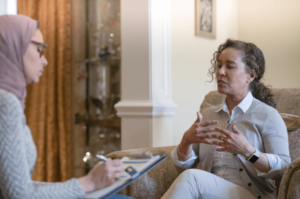This blog shares details about therapy after an IOP (intensive outpatient program). IOP programs are structured treatment programs used to address substance use, comorbid mental health disorders, or other issues that do not require hospitalization or rehabilitation. These programs offer group therapy, individual therapy, and are intensive in terms of their schedule.
IOP programs are designed for all ages depending on the presenting problem. There are IOP programs for children, teenagers, young adults, and older adults. Each setting varies in their treatment schedule. Typically, IOP programs include treatment several days per week, for a few hours per day.
Common issues to start IOP treatment include depression, suicidal thoughts, self-harming behavior, trauma, substane use, anxiety, and more.
Individuals can be in IOP programs for several months. When it is deemed clinically appropriate, an individual will “graduate” from their program and be considered done with their treatment. It is common to attend IOP programs numerous times to address current needs and issues as they arise or linger.
Outpatient therapy after IOP is recommended to maintain the progress made. This blog shares the following information: who would benefit from outpatient treatment? How does it differ from an IOP program, and how is it the same? And, how do you know if someone is the right therapist for your continued care? For instance, teen therapy helps adolescents continue progress made in IOP with someone who specializes in working with teens.
Therapy after IOP: Who would benefit from therapy after IOP?

Anyone seeking to continue care after IOP programs would benefit from therapy after IOP. While it is not required by the program, it is often recommended. For example, a teen enters IOP treatment for substance use, self harming behaviors, and suicidal thoughts. Although they have completed treatment in an IOP, therapy can help them as well as their family continue to receive support.
You may want to continue maintaining the progress you’ve made in the program. It is common to receive treatment, complete it, and then relapse into behaviors like self-harm or substance use. Therefore, receiving that continued support can help in preventing that in the future, or working to resolve it in the present moment.
You may also have a desire to continue therapy after IOP due to finding that additional, consistent support helps you manage your symptoms.
It can bring you comfort knowing you have a designated person to confide in and work with. Working with a compassionate, non-judgmental therapist can help you continue to make the most out of the treatment you received. You may also feel that the IOP treatment did not not fully address your longer-term goals, and going a more focused route could be an appropriate setting for you.
However, therapy after IOP is not recommended to replace IOP treatment programs. If your needs are deemed appropriate for an IOP setting, you would be referred to a local program. Depending on the intake assessment you complete with our group, we can determine the best option for your current needs and situation.
Therapy for anxiety and depression helps you in continuing managing your symptoms. Make sure to check out our blog about 5 Ways to Cope with Depression!
Therapy after IOP: How does it differ from my IOP program, and how is it the same?

There are different and similar aspects between IOP programs and therapy after IOP. For starters, the treatment schedule differs. Depending on where you received treatment, you probably had sessions 3-5 times per week for a few hours each time. A set schedule would include group sessions, individual sessions, family sessions, and other activities.
In therapy after IOP, you meet with your therapist only once or twice per week for about an hour. This is the standard in the beginning, and the frequency can also be modified as you continue to progress. It’s common for individuals to go down in frequency when clinically appropriate to once every other week as well.
The therapists are not usually available outside of the scheduled therapy hours. They can be contacted via text, phone, or email for cancellations or rescheduling. However, they may not be as available outside of sessions as your treatment team in IOP.
Alongside this, the sessions are obviously more individual focused and do not take place in a group setting. While therapy practices can offer group therapy as well, that often has to be pre-established. They may not always be on-going or available depending on the practice you get started with.
Finally, since you’re working one on one with the therapist, you will not have a team available to you in this setting. IOP programs usually have a team of multiple therapists, and possibly more medical staff or specialists. This includes nutritionists, psychiatrists, or more. It’s possible they may have helpful office staff (like New Leaf MFT!), but otherwise it would just be you and your therapist. Depending on other providers you’re working with, your therapist may find it appropriate to collaborate with other professionals who oversee your care.
Teen therapy matches you or your teenager up with an experienced teen-specializing therapist. They have worked to support teens through various issues, as well as having experience in working with parents or the family as a whole. Parents, it’s essential to read our blog on 5 Crucial Steps Parents Can Take to Prevent Teen Suicide.
Therapy after IOP: How do I know if someone is the right therapist for me?

For starting therapy after IOP, you want to make sure the therapist is the right fit for you. It’s true that therapists have differing levels of expertise and specialties. It’s important for your continued care that you work with someone who is competent and compassionate. Furthermore, it’s best to work with a therapist whose personality aligns well with yours.
You’ll want to find someone familiar with the issues and concerns that came up for you while in treatment. For trauma, it’s best if you work with a therapist who is trauma-informed. You may be a part of LGBTQ+ or BIPOC community, therefore having an LGBTQ or BIPOC affirmative therapist is essential.
If you were in IOP for treating an eating disorder, you should work with an eating disorder specialist. Therapists and mental health providers have an established understanding of issues like depression or anxiety. Therefore, it would really come down to working with someone you feel comfortable with.
Therapy after IOP for in-person sessions is also recommended over virtual sessions. It may not always be an available or feasible option, therefore ensure your confidence in the therapist you choose to work with. It’s also important to see someone consistently, so that there is no lapse in treatment. Typically, you’ll start off on a weekly basis, and collaborate with your therapist to discuss frequency after some time.
Trauma therapy provides you with a safe space to continue your healing journey. If you’re curious about trauma informed therapy, check out our blog on 3 Reasons to Start Childhood Trauma Therapy.
Continuing to prioritize your mental health will benefit you long-term as you can better manage stressors that life can throw your way.
In-person therapy is ideal for those seeking a separate, safe space from their home. Check out our blog on Online Therapy or In Office Therapy to understand what format is best for you. For getting started in therapy after IOP, read our blog on Therapy: Where to Start.
By seeking out support, you can begin your journey to feeling relief. You don’t have to go through finding the right level of support alone, either. Make sure to check out our blog on How to Validate Yourself!
Consider calling our therapy group at (805) 774-1506 for a free consultation! Make sure to check out our blog on How to Sit with Uncomfortable Feelings as well as our blog on Men’s Mental Health Matters.
Seek out a validating, safe environment with us today. We will help you get to where you want to be. Our therapists provide teen therapy, individual adult therapy, LGBTQIA+ therapy, anxiety therapy, depression therapy, family therapy, and more in-office in Simi Valley, CA.
 Monday – Friday: 9:00 am to 6:00 pm
Monday – Friday: 9:00 am to 6:00 pm 2489 Tapo St. Suite B
2489 Tapo St. Suite B  805-774-1506
805-774-1506